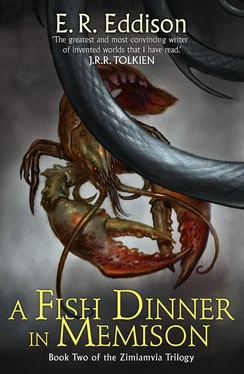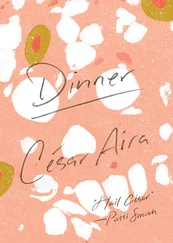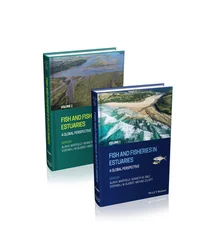This subject, seen in one aspect, we call Time, in another we call it Eternity. In both of these there is a somewhat which is timeless and tireless and infinite – that something is you and me and E. R. Eddison. It delights in, and knows nothing of, and cares less about, its own seeming evolution in time, or its own actions and reactions, howsoever or wheresoever, in eternity. It just (whatever and wherever it is) wills to be, and to be powerful and beautiful and violent and in love. It enjoys birth and death, as they seem to come with insatiable appetite and with unconquerable lust for more.
The personages of this book are living at the one moment in several dimensions of time, and they will continue to do so for ever. They are in love and in hate simultaneously in these several dimensions, and will continue to be so for ever – or perhaps until they remember, as Brahma did, that they had done this thing before.
This shift of time is very oddly, very simply, handled by Mr Eddison. A lady, the astounding Fiorinda, leaves a gentleman, the even more (if possible) astounding Lessingham, after a cocktail in some Florence or Mentone. She walks down a garden path until she is precisely out of his sight: then she takes a step to the left, right out of this dimension and completely into that other which is her own – although one doubts that fifty dimensions could quite contain this lady. Whereupon that which is curious and curiously satisfying, Mr Eddison’s prose takes the same step to the left and is no more the easy English of the moment before, but is a tremendous sixteenth- or fifteenth-century English which no writer but he can handle.
His return from there and then to here and now is just as simple and as exquisitely perfect in time-phrasing as could be wished for. There is no jolt for the reader as he moves or removes from dimension to dimension, or from our present excellent speech to our memorable great prose. Mr Eddison differs from all in his ability to suit his prose to his occasion and to please the reader in his anywhere.
This writer describes men who are beautiful and powerful and violent – even his varlets are tremendous. Here, in so far as they can be conjured into modern speech, are the heroes. Their valour and lust is endless as is that of tigers: and, like these, they take life or death with a purr or a snarl, just as it is appropriate and just as they are inclined to. But it is to his ladies that the affection of Mr Eddison’s great and strange talent is given.
Women in many modern novels are not really females, accompanied or pursued by appropriate belligerent males – they are mainly excellent aunts, escorted by trustworthy uncles, and, when they marry, they don’t reproduce sons and daughters, they produce nephews and nieces.
Every woman Mr Eddison writes of is a Queen. Even the maids of these, at their servicings, are Princesses. Mr Eddison is the only modern man who likes women. The idea woman in these pages is most quaint, most lovely, most disturbing. She is delicious and aloof: delighted with all, partial to everything ( ça m’amuse , she says). She is greedy and treacherous and imperturbable: the mistress of man and the empress of life: wearing merely as a dress the mouse, the lynx, the wren or the hero: she is the goddess as she pleases, or the god; and is much less afraid of the god than a miserable woman of our dreadful bungalows is afraid of a mouse. And she is all else that is high or low or even obscene, just as the fancy takes her: she falls never (in anything, nor anywhere) below the greatness that is all creator, all creation, and all delight in her own abundant variety. Je m’amuse , she says, and that seems to her, and to her lover, to be right and all right.
The vitality of the recording of all this is astonishing: and in this part of his work Mr Eddison is again doing something which no other writer has the daring or the talent for.
He is also trying to do the oddest something for our time – he is trying to write prose. ’Tis a neglected, almost a lost, art, but he is not only trying, he is actually doing it. His pages are living and vivid and noble, and are these in a sense that belongs to no other writer I know of.
His Fish Dinner is a banquet such as, long ago, Plato sat at. As to how Mr Eddison’s philosophy stands let the philosophers decide: but as to his novel, his story-telling, his heroical magnificence of prose, and his sense of the splendid, the voluptuous, the illimitable, the reader may judge of these things by himself and be at peace or at war with Mr Eddison as he pleases.
This is the largest, the most abundant, the most magnificent book of our time. Heaven send us another dozen such from Mr Eddison,
JAMES STEPHENS
15th December 1940
A LETTER OF INTRODUCTION
TO GEORGE ROSTREVOR HAMILTON
MY dear George,
You have, for both my Zimiamvian books, so played Pallas Athene – sometimes to my Achilles sometimes to my Odysseus – counselling, inciting, or restraining, and always with so foster-brotherly an eye on the object we are both in love with, that it is to you sooner than to anyone else that this letter should be addressed. To you, a poet and a philosopher: from me, who am no poet (for my form is dramatic narrative in prose), nor philosopher either. Unless to be a humble lover of wisdom earns that name, and to concern myself as a storyteller not so much with things not of this world as with those things of this world which I take to be, because pre-eminently valuable, therefore pre-eminently real.
The plain ‘daylight’ parts of my story cover the years from April 1908 to October 1933; while, as for the month that runs contemporaneously in Zimiamvia (from Midsummer’s Day, Anno Zayanae Conditae 775, when the Duke first clapped eyes on his Dark Lady, to the 25th July, when his mother, the Duchess of Memison, gave that singular supper-party), it is sufficient to reflect that the main difference between earth and heaven may lie in this: that here we are slaves of Time, but there the Gods are masters.
There are no hidden meanings: no studied symbols or allegories. It is the defect of allegory and symbolism to set up the general above the individual, the abstract above the concrete, the idea above the person. I hold the contrary: to me the value of the sunset is not that it suggests to me ideas of eternity; rather, eternity itself acquires value to me only because I have seen it (and other matters besides) in the sunset and (shall we say) in the proud pallour of Fiorinda’s brow and cheeks – even in your friend, that brutal ferocious and lionlike fox, the Vicar of Rerek – and so have foretasted its perfections.
Personality is a mystery: a mystery that darkens as we suffer our imagination to speculate upon the penetration of human personality by Divine, and vice versa. Perhaps my three pairs of lovers are, ultimately, but one pair. Perhaps you could as truly say that Lessingham, Barganax, and the King (on the one hand), Mary, the Duchess, and Fiorinda (on the other), are but two persons, each at three several stages of ‘awakeness’, as call them six separate persons.
And there are other teasing mysteries besides this of personality. For example: Who am I? Who are you? Where did we come from? Where are we going? How did we get here? What is ‘here’? Were we ever not ‘here’, and, if so, where were we? Shall we someday go elsewhere? If so, where? If not, and yet we die, what is Death? What is Time, and why? Did it have a beginning, and will it have an end? Whatever the answer to the last two questions (i.e., that time had a beginning or that it had not: or an end) is either alternative conceivable? Are not both equally inconceivable? What of Space (on which very similar riddles arise)? Further , Why are we here? What is the good of it all? What do people mean when they speak of Eternity, Omnipotence, God? What do they mean by the True, the Good, the Beautiful? Do these ‘great and thumping words’ relate to any objective truth, or are they empty rhetoric invented to cheer or impress ourselves and others: the vague expressions of vague needs, wishes, fears, appetites of us, weak children of a day, who know little of (and matter less to) the vast, blind, indifferent, unintelligible, inscrutable, machine or power or flux or nothingness, on the skirts of whose darkness our brief lives flicker for a moment and are gone?
Читать дальше












